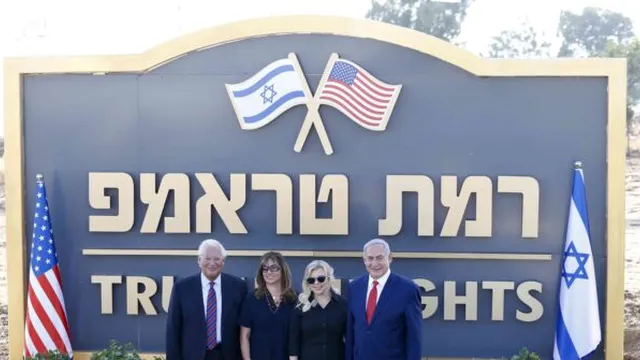
Israel seeks peace with Syria and Lebanon while refusing to cede Golan Heights
2025-06-30 10:28- Israel's Foreign Minister Gideon Sa'ar expressed interest in establishing peace with Syria and Lebanon.
- Israel confirmed it will not negotiate the status of the Golan Heights in future deals.
- The complexity of peace talks indicates potential challenges due to internal Syrian divisions and historical grievances.
Express your sentiment!
Insights
In the context of ongoing geopolitical tensions, Israel has expressed its intent to pursue a peace deal involving Syria and Lebanon, as confirmed by Foreign Minister Gideon Sa'ar during a press briefing. This initiative comes as part of a larger Middle East peace plan anticipated by the Trump administration, particularly in the aftermath of the 12 Day War, which saw significant military engagement with Iran. While Israel is open to establishing official diplomatic ties with both neighboring nations, it has firmly stated that the Golan Heights will not be part of any negotiations. The Golan Heights, which Israel seized during the Six Day War in 1967, has remained a significant point of contention and a matter of national security for Israel. Despite potential diplomatic openings, analysts suggest that there are internal divisions within the Syrian government regarding the depth of engagement with Israel. Reports indicate that President Ahmed al-Sharaa is interested in recognizing Israel and may support a limited security agreement rather than a comprehensive peace deal. This divide highlights a broader struggle within the Syrian regime, where hardliners fear that deeper ties with Israel could undermine their authority and lead to dependency on Israel and Saudi Arabia. The complexities extend to how areas of southern Syria and the Golan Heights could be managed in future agreements, with mentions of transforming parts of the Golan into a collaborative peace garden project involving Syria, Israel, and potentially Jordan. The diplomatic dealings also come amid U.S. outreach efforts aimed at coaxing Syria into the Abraham Accords, aiming to normalize relations between Israel and several Arab states. Overall, while the vision of peace between Israel and its neighbors aligns with regional strategic interests, the realities of entrenched positions, historical grievances, and ongoing security concerns pose challenges to the realization of such agreements.
Contexts
The Golan Heights, a strategically significant plateau located in the Levant region, has a complex history intertwined with the geopolitical dynamics of the Middle East. Its elevated terrain offers commanding views over the surrounding areas, making it a crucial military asset. Originally part of the French Mandate of Syria, the Golan Heights was incorporated into the State of Israel after the Six-Day War in 1967. This shift in control prompted ongoing disputes, as Syria regards the region as occupied territory and calls for its return. The international community has largely supported Syria's claim, although Israel asserts that the Golan Heights is integral to its national security and has remained administratively separate from Syria since its annexation in 1981, a move not widely recognized internationally. The region's historical significance extends beyond military considerations. The Golan Heights is known for its rich agricultural land, particularly its vineyards and orchards that thrive due to its unique geographical features. Additionally, the area holds biblical significance, being referenced in various historical texts. The ongoing conflict and territorial disputes have hindered economic development in the region, yet Israel has invested heavily in the area, enhancing agricultural productivity and developing tourism to promote stability. As of June 2025, the political climate surrounding the Golan Heights remains tense. The Syrian government, alongside various international actors, continues to challenge Israel's control over the territory. Diplomatic efforts to restore peace have seen limited success, with cycles of negotiations interrupted by outbreaks of violence and shifting power dynamics in the region. Moreover, the rise of non-state actors and ongoing instability in Syria complicate the return to dialogue regarding the Golan Heights, as both the Assad regime and opposition groups prioritize differing national interests. The future of the Golan Heights will likely depend on broader Middle East peace processes, regional stability, and Israel's domestic politics. Over the years, various peace initiatives have been proposed, aimed at reconciling the interests of Israel and Syria. However, historical grievances, national security concerns, and the quest for legitimacy remain major hurdles. The Golan Heights' strategic significance, coupled with its demographic and cultural complexities, ensures it will remain a focal point in Israeli-Syrian relations and broader geopolitical discussions.